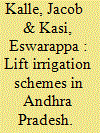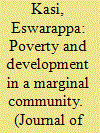|
|
|
Sort Order |
|
|
|
Items / Page
|
|
|
|
|
|
|
| Srl | Item |
| 1 |
ID:
148515


|
|
|
|
|
| Summary/Abstract |
Despite efforts by the Indian state to develop and maintain various irrigation strategies, many projects have not achieved the desired results, often due to systemic problems inherent in these initiatives. Meanwhile, the growing scarcity of water in South Asia propels new thinking about remedies. Based on detailed fieldwork, this article, which seems at first completely unrelated to matters of caste discrimination, assesses the sustainability of lift irrigation schemes (LIS) in Andhra Pradesh (AP). Asking critical questions about the management of such schemes, it also addresses the impact of new technologies on rural development, arguing that continuing technology-savvy engagement of the state in the irrigation sector is needed. While it is found that apart from issues of better management, increased use of solar energy could be a real boon for strengthening economic viability and environmental sustainability, the research identifies additional reasons, of a socio-political nature, which may explain why state support for marginal farmers in the area under examination is being withheld.
|
|
|
|
|
|
|
|
|
|
|
|
|
|
|
|
| 2 |
ID:
102751


|
|
|
|
|
| Publication |
2011.
|
| Summary/Abstract |
The concepts of poverty and development have many meanings in contemporary globalized societies. Development by definition implies desired changes in terms of livelihood, improved quality of life and better access to assets and services, etc. However in reality development programmes sometimes have negative consequences, perhaps unintended, multiplying the acute scarcity of resources and opportunities, or reproducing poverty. Also, the consequences of developmental programmes often appear to be out of focus, and seen at the ground level, there seems to be a gap between what is intended and what is actualized. In this framework, this paper presents a case study of the social, cultural and economic correlates of the development processes in Adadakulapalle, a settlement of Sugali peoples, once a semi-nomadic tribe, in Anantapur District of Andhra Pradesh, South India. The paper shows how factionalism and faction politics affect the implementation of development interventions. It also looks at the poverty in the settlement and focuses on the types of change that people have experienced with the implementation of different schemes by both government and other agencies. The type of change is discussed in the present study through the macro and micro analysis of development programmes.
|
|
|
|
|
|
|
|
|
|
|
|
|
|
|
|
|
|
|
|
|